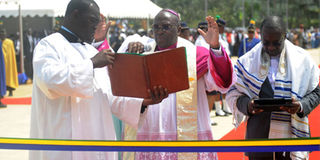Expect routine weather, few people in Gabon

Ready. Archbishop of Oyem Jean Vincent blesses the stadium during the inauguration of Stade d’Oyem in Oyem, Gabon ahead of the Africa Cup of Nations football tournament. Four stadiums will host matches in the January 14-February 5 tournament. PHOTO BY AFP
What you need to know:
- The 2017 Africa Cup of Nations gets underway in Gabon on Saturday and runs to February 5.
- Here is a run down of what to expect at the tournament.
KAMPALA.
We are probably experiencing the some of the hottest temperatures in Uganda in ages but for hundreds of Ugandans who will travel to Gabon this week, the beat goes on.
As the country hosts the biennial Africa Cup of Nations with Uganda Cranes part of the dance for the first time in 39 years, it will be a familiar place for many of us.
According to internet website, www.africas-eden.com, this period is “ideal for photography” with temperatures touching 29 degrees centigrade. “(It is a) small dry season, (with a) clear blue sky, very little rainfall,” the site says. If further warns of “more mosquitos, fourous and Tsetse (flies) than in the long dry season.”
Much smaller
With a total population of just 1.5m people. Gabon’s population is almost at par with Kampala’s.
Like Uganda, Gabon is sliced by the equator. It is bordered by Equatorial Guinea to the northwest, Cameroon to the north, the Republic of the Congo on the east and south, and the Gulf of Guinea.
It has an area of nearly 270,000 square kilometres (100,000 sq mi). Its capital and largest city is Libreville. The city is a port on the Komo River, near the Gulf of Guinea, and a trade center for a timber region. Cranes will be play two of their three group games in Port-Gentil, Gabon’s second city.
It is the leading seaport. It is the center of Gabon’s petroleum and timber industries. Although it lies inshore, the nearby mainland is a remote forest area and it is not connected by road to the rest of the nation. Many Ugandans will only access it by air or water.
Culture
Like the weather, the food will not be too alien. The food staples such as cassava, rice and yams are commonly used. Meats, when available, include chicken and fish, and bush meats such as antelope, wild boar and monkey.
Almost all Gabonese are of Bantu origin. Gabon has at least 40 ethnic groups with differing languages and cultures.
The Fang are generally thought to be the largest, although recent census data seem to favor the Nzebi.
Others include the Myene, Kota, Shira, Puru, and Kande. Ethnic boundaries are less sharply drawn in Gabon than elsewhere in Africa.
There are also various Pygmy peoples: the Bongo, Kota, and Baka; the latter speak the only non-Bantu language in Gabon.
Most ethnicities are spread throughout Gabon, leading to constant contact and interaction among the groups.
Intermarriage between the ethnicities is quite common, helping reduce ethnic tensions. French, the language of its former colonial ruler, is a unifying force.
Hosting Afcon/Messi
The 2017 Afcon, the 31st edition, will be hosted by the West African country but this was only a compromise host. The tournament was scheduled to be staged by Libya, until Caf rescinded its hosting rights in August 2014 due to ongoing war in the country. This event is also part of Caf’s 60th anniversary.
While it’s not known to have a rich history in sports, the current president Ali Bongo Odimba has previously hosted Argentina maestro Lionel Messi.
The Gabonese government had to deny claims that the Barcelona ace was paid £2.5m (Shs11bn) to visit the country to take part in a ceremony to open the stadium in Port-Gentil.
Messi has been accused by activists of endorsing a central African “dictatorship” that has failed to halt the ritual murder of children.
The Barcelona striker and children’s rights advocate visited Gabon in July, 2015. The US-based Human Rights Foundation said that Messi “displayed enthusiastic support” for Ali Bongo.
Politics turns ugly
Since independence from France in 1960, Gabon has had just three presidents. Late President Omar Bongo ruled for more than four decades until his death in 2009.
During Omar Bongo’s rule, Gabon maintained a close relationship with France under a system known as “Francafrique”, receiving both political and military support in exchange for business favours.
But relations have cooled since his son Ali won a contested election in 2009 and French authorities launched a long-running corruption investigation into the family’s assets. Protests were again prominent after his re-election last year as he beat former African Union chairperson Jean Ping to stretch his rule in the oil-rich country.
Internet access
Gabon’s main broadcast media are government-controlled.
In 2013, Reporters Without Borders acknowledged the authorities had made some progress in media freedom but said journalists still faced “police brutality and intimidation by officials”.
The watchdog called for an overhaul of the country’s 2001 media law. There were more than 670,000 internet users out of a population of 1.5 million by November 2015.




